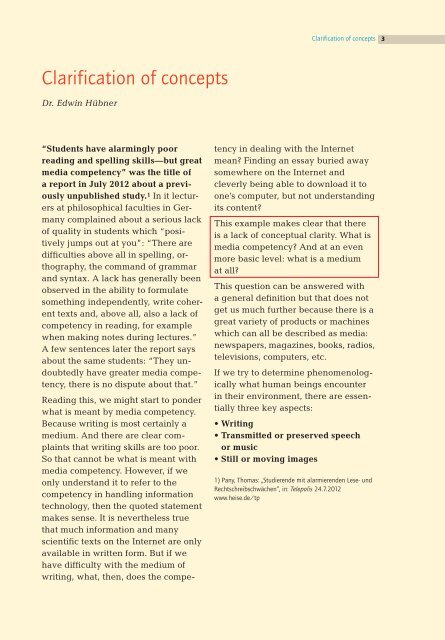Struwwelpeter 2.0
Struwwelpeter_engl_August_2015
Struwwelpeter_engl_August_2015
- No tags were found...
You also want an ePaper? Increase the reach of your titles
YUMPU automatically turns print PDFs into web optimized ePapers that Google loves.
Clarification of concepts 3<br />
Clarification of concepts<br />
Dr. Edwin Hübner<br />
“Students have alarmingly poor<br />
reading and spelling skills—but great<br />
media competency” was the title of<br />
a report in July 2012 about a previously<br />
unpublished study. 1 In it lecturers<br />
at philosophical faculties in Germany<br />
complained about a serious lack<br />
of quality in students which “positively<br />
jumps out at you”: “There are<br />
difficulties above all in spelling, orthography,<br />
the command of grammar<br />
and syntax. A lack has generally been<br />
observed in the ability to formulate<br />
something independently, write coherent<br />
texts and, above all, also a lack of<br />
competency in reading, for example<br />
when making notes during lectures.”<br />
A few sentences later the report says<br />
about the same students: “They undoubtedly<br />
have greater media competency,<br />
there is no dispute about that.”<br />
Reading this, we might start to ponder<br />
what is meant by media competency.<br />
Because writing is most certainly a<br />
medium. And there are clear complaints<br />
that writing skills are too poor.<br />
So that cannot be what is meant with<br />
media competency. However, if we<br />
only understand it to refer to the<br />
competency in handling information<br />
technology, then the quoted statement<br />
makes sense. It is nevertheless true<br />
that much information and many<br />
scientific texts on the Internet are only<br />
available in written form. But if we<br />
have difficulty with the medium of<br />
writing, what, then, does the competency<br />
in dealing with the Internet<br />
mean? Finding an essay buried away<br />
somewhere on the Internet and<br />
cleverly being able to download it to<br />
one’s computer, but not understanding<br />
its content?<br />
This example makes clear that there<br />
is a lack of conceptual clarity. What is<br />
media competency? And at an even<br />
more basic level: what is a medium<br />
at all?<br />
This question can be answered with<br />
a general definition but that does not<br />
get us much further because there is a<br />
great variety of products or machines<br />
which can all be described as media:<br />
newspapers, magazines, books, radios,<br />
televisions, computers, etc.<br />
If we try to determine phenomenologically<br />
what human beings encounter<br />
in their environment, there are essentially<br />
three key aspects:<br />
• Writing<br />
• Transmitted or preserved speech<br />
or music<br />
• Still or moving images<br />
1) Pany, Thomas: „Studierende mit alarmierenden Lese- und<br />
Rechtschreibschwächen“, in: Telepolis 24.7.2012<br />
www.heise.de/tp


